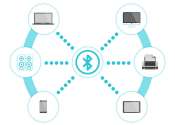A mobile phone or mobile (also called cellphone and handphone, as well as cell phone, wireless phone, cellular phone, cell, cellular telephone, mobile telephone or cell telephone) is a long-range, electronic device used for mobile voice or data communication over a network of specialized base stations known as cell sites. In addition to the standard voice function of a mobile phone, telephone, current mobile phones may support many additional services, and accessories, such as SMS for text messaging, email, packet switching for access to the Internet, gaming, Bluetooth, infrared, camera with video recorder and MMS for sending and receiving photos and video, MP3 player, radio and GPS. Most current mobile phones connect to a cellular network consisting of switching points and base stations (cell sites) owned by a mobile network operator (the exception is satellite phones, which are mobile but not cellular).
As opposed to a radio telephone, a mobile phone offers full duplex communication, automatised calling to and paging from a public switched telephone network (PSTN), handoff (am. English) or handover (European term) during a phone call when the user moves from one cell (base station coverage area) to another. A mobile phone offers wide area service, and should not be confused with a cordless telephone, which also is a wireless phone, but only offer telephony service within a limited range, e.g. within a home or an office, through a fixed line and a base station owned by the subscriber.
The International Telecommunication Union estimated that mobile cellular subscriptions worldwide would reach approximately 4.1 billion by the end of 2008. Mobile phones have gained increased importance in the sector of Information and communication technologies for development in the 2000s and have effectively started to reach the bottom of the economic pyramid.









